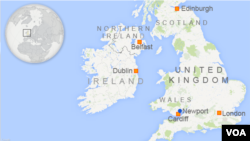NATO leaders opened a high-stakes summit in Wales Thursday, confronted by the Islamic State advance in the Mideast and Russia's military intervention in Ukraine.
Leaders from 28 countries in the U.S.-European military alliance met at a golf resort in Wales, with the discussions aimed at combating the Islamic militants in Iraq and Syria and halting the fighting in eastern Ukraine between Kyiv's forces and pro-Russian separatists.
Ukraine President Petro Poroshenko, who will attend the summit as a non-member invitee, met with U.S. President Barack Obama, British Prime Minister David Cameron and other key leaders before the two-day summit, as Kyiv and the insurgents moved toward a possible cease-fire on Friday.
NATO Secretary General Anders Fogh Rasmussen said the alliance would "take important steps to counter" the Islamic State and Moscow's intervention in Ukraine, but it is unclear what new measures NATO might adopt.
The West has ruled out military intervention in Ukraine, which is an alliance partner of NATO, not a full member that other NATO members would be obligated to defend.
As the NATO meeting opened, Russian Foreign Minister Sergey Lavrov sternly warned that any Ukraine move to join NATO would "derail efforts" toward a cease-fire.
Lavrov urged Kyiv and pro-Russian rebels fighting Ukrainian forces in eastern Ukraine to back peace moves outlined a seven-point cease-fire plan on Wednesday by Russian President Vladimir Putin and avert what he said could be a large-scale crisis in the heart of Europe.
More sanctions considered
Western nations have already imposed wide economic sanctions on Russia and said they are considering other measures.
Obama and Cameron said in an opinion piece in the Times of London that they would not be intimidated by the Islamic State, which has already beheaded two American journalists and is threatening a Briton with execution because of the U.S. bombardment of Islamic State militants' positions in Iraq.
In addition to considering its options in Ukraine and the Mideast, NATO leaders talked about the unsettled end to its 13-year war against al-Qaida in Afghanistan.
The U.S.-led operations are set to end in four months and NATO had expected to welcome a new Afghan leader to its summit.
But Kabul has yet to declare a winner in the June presidential run-off and no new security pact has been reached with the West to keep several thousand troops in Afghanistan beyond December 31.
Also at the summit, NATO leaders are expected to discuss strategies for countering the threat from the Islamic State militant group that has overrun large parts of northern Iraq and eastern Syria.
The U.S. has been carrying out airstrikes against the group in Iraq, while other alliance members have begun providing humanitarian aid.
The two-day NATO summit outside the Welsh city of Newport is also expected to discuss formation of a rapid-response military force capable of deploying on short notice to trouble spots in eastern Europe
Russia, which has strongly opposed any NATO presence near its borders, has denounced the idea of a rapid-response unit.
Earlier this week, Russia said it will review its own military strategies in eastern Europe if NATO endorses creation of the force.
Material for this report came from Reuters.

